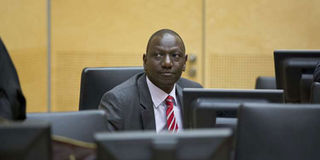William Ruto seeks to appeal evidence ruling at ICC

Mr William Ruto at the International Criminal Court on September 10, 2013. He wants to appeal a ruling that allowed the admission of prior statements recorded by hostile witnesses as evidence. FILE PHOTO | NATION MEDIA GROUP
What you need to know:
- His lawyer Karim Khan raises 11 issues that he hopes will convince the Trial Chamber judges to allow his team to contest last week’s ruling.
Mr Ruto’s co-accused Joshua arap Sang’s lawyer Katwa Kigen has also sought leave to appeal.
Mr Khan argues that the ruling poses a danger to his client since Prosecutor Fatou Bensouda argues that the statements are central to the charges of crimes against humanity against Mr Ruto.
He describes the statement as “hearsay, uncorroborated and second-hand”.
Deputy President William Ruto has sought permission to appeal an ICC ruling that poses a threat of new charges against him at The Hague.
His lawyer Karim Khan raises 11 issues that he hopes will convince the Trial Chamber judges to allow his team to contest last week’s ruling in which prior statements recorded by hostile witnesses were admitted as evidence.
Mr Ruto’s co-accused Joshua arap Sang’s lawyer Katwa Kigen has also sought leave to appeal.
Mr Khan argues that the ruling poses a danger to his client since Prosecutor Fatou Bensouda argues that the statements are central to the charges of crimes against humanity against Mr Ruto.
He describes the statement as “hearsay, uncorroborated and second-hand”.
HOSTILE WITNESSES
“If any of the eleven issues were wrongly decided, the consequences will significantly affect the outcome of the trial, as they relate to the amount and type of evidence that the Chamber will have to consider when making its final determination. The judgment will be based, in part, on hearsay which should not be before the court,” he says in the application filed on Wednesday.
Mr Khan submits that the “hearsay statements” will make it difficult for the defence team to argue their case in court since they will not get a chance to interrogate the hostile witnesses, a situation that gives the prosecutor advantage.
“The admission of hearsay evidence, which is central to the OTP’s case, will significantly affect the fair conduct of proceedings because it will not only affect the defence’s ability to properly test the OTP’s case but to adequately make its case, with a view to influencing the outcome of the proceedings in its favour,” he argues.
ADEQUATE EVIDENCE
Last week, judges Chile Eboe-Osuji, Olga Herrera Carbuccia and Robert Fremr ruled that there was adequate evidence from the prosecution to support claims by Ms Bensouda that five of the witnesses were influenced — through bribes or intimidation — to recant their statements.
In her application, Ms Bensouda had informed the judges that the sixth witness had disappeared and was yet to be found.
“In order to prove the interference with the witness, the prosecution relies on several materials, including a statement of the witness, which have been admitted as evidence in the case. The Prosecution also relies on in-court testimony,” the judges said.
RECANT TESTIMONY
The judges also agreed there were attempts to convince a witness to recant his testimony whereby an unidentified person spoke to him shortly before his testimony and “tried to convince him not to worry because the preparation for court was good”.
Another witness was said to have admitted during his testimony in court that he had financial difficulties and discontinued cooperation with the prosecution because he was sent “very little money”.
But in his application, Mr Khan argues that the ruling would give the prosecution a chance to use “linkage” evidence as the core of their case, an action that will have a lasting impact on the trial of Mr Ruto.
He argues that admission of the statements amounted to trying his client in retrospect.
IMPACT ON COURT
He also warns that the ruling sought to prove Ms Bensouda’s position that Mr Ruto and people known to him worked to influence witnesses to recant their statements.
“This evidence cannot be reasonably be construed as showing that …. was…. The subject of any interference. Thus it is clear that the standard was improperly applied because there is no evidence of sufficient specificity and probative value on which the majority could be satisfied that interference occurred,” he argues.
Mr Ruto’s lawyer claims the ruling had broadened the prosecution’s evidence beyond the testimonies of the witnesses in court, which will have a long lasting impact on the trial.
Further, Mr Khan argues that the judges had wrongly applied Rule 68 and requested them to allow the defence to appeal against the decision.




